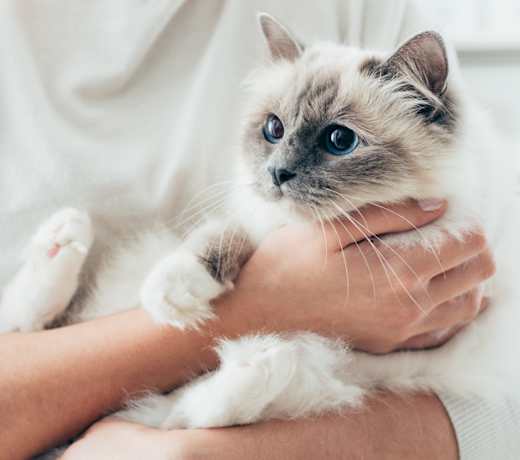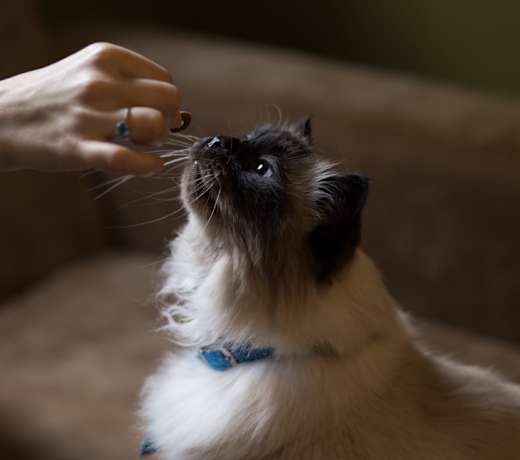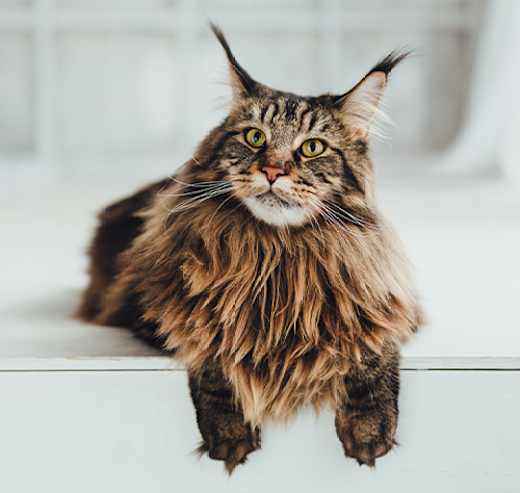Due to their mixed ancestry, domestic longhairs can have amber, green, gold, or blue eyes. Some domestic longhairs may have heterochromia, where each eye is a different color.
Domestic Longhair
Breed Type: Western
Common nicknames: Longhaired Housecat, Longhaired Moggie, HCL
Coat: Long-haired
Hypoallergenic: No, they will likely trigger allergies.
Temperament: Friendly, affectionate, independent, playful
Life expectancy: 12-20 years
Color & patterns:
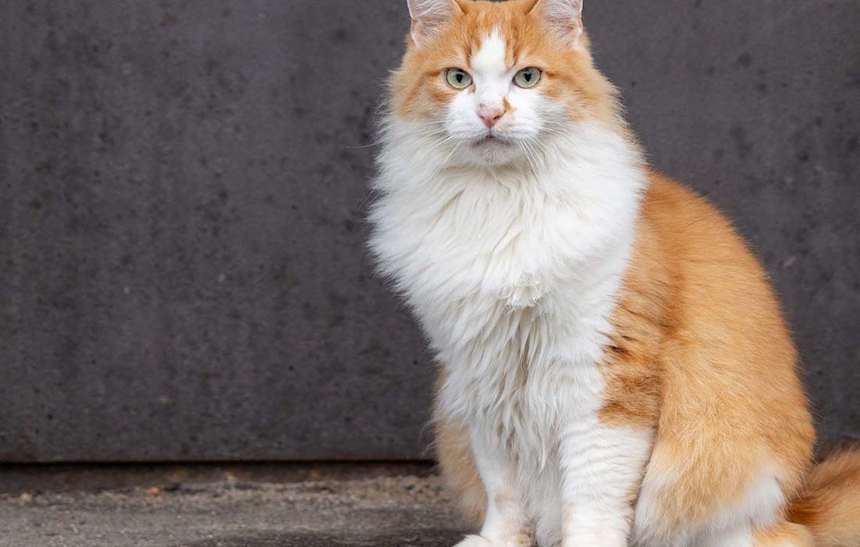
“Domestic Longhair” is a catch-all term for mixed-breed cats with diverse ancestries. With no specific breed standards or definitive lineage, Domestic Longhairs are like a box of chocolates — you never know what you’re going to get. But whether it’s their coat color, eye shape, or personality quirks, one thing remains constant: These cats are delightful companions. Domestic Longhairs tend to be adaptable, affectionate, and have a “go with the flow” attitude that makes them great family pets. They love curling up in laps, chasing after toys, and partaking in family activities. If you’re after a cat who offers an exciting mix of the unexpected with a guarantee of affectionate companionship, a Domestic Longhair is a good choice.
Domestic Longhair characteristics
Learn about about Domestic Longhair basics like their fur colors, shedding levels, how much grooming they need, and other Domestic Longhair facts.
Average height
8-12 inches (20.3-30.5cm)
Average weight
6-20 pounds (2.7-9.1 kg)
Average lifespan
12-20 years
Good with other cats
Good with dogs
Affection
Shedding
Health
Exercise needs
What color are domestic longhair cats?
Domestic longhairs can pretty much be any color, including black, white, gray, or brown, and there are various combinations of these colors in tabby, tortoiseshell, calico, or bi-color patterns. The wide variety in their coat colors and patterns is a result of the mixed ancestry inherent in domestic longhair cats.
How big do domestic longhair cats get?
Domestic longhair cats weigh between eight and 20 pounds and stand 8 to 12 inches tall, but their size can vary widely. Some of these kitties may be more petite, while others might be larger in size.
At what age do domestic longhair cats stop growing?
Domestic longhair cats stop growing around one to two years of age. Factors such as genetics, diet, and overall health can influence the timing of their maturity. While most of a cat’s physical development occurs within the first year, some cats may continue to fill out and change up to the age of three.
What breed is a domestic longhair cat?
The term “domestic longhair” is not a specific breed but rather describes cats with long fur that are of mixed or unknown ancestry. Domestic longhair cats can have various coat colors, patterns, and temperaments. These types of cats are the kind you’ll find at shelters and rescues everywhere.
How long do domestic longhair cats live?
Domestic longhair cats live between 12 and 20 years old, but lifespans vary. Factors influencing a cat’s longevity include genetics, overall health, diet, veterinary care, and living conditions. Giving your kitty regular veterinary check-ups, a balanced diet, and a safe and enriched environment can contribute to their well-being.
Domestic Longhair temperament
Learn about about the Domestic Longhair temperament and how well they fit into your lifestyle, home environment, and family.
Are domestic longhairs lap-cats?
Yes, domestic longhairs can be lap-cats. While many domestic longhairs have an affectionate nature and may enjoy sitting on laps, it ultimately depends on each cat’s unique personality. Some domestic longhairs may seek out lap time as a way to bond and receive attention, while others may prefer to express their affection in other ways.
Do domestic longhairs meow a lot?
Yes, domestic longhairs can meow a lot, but the tendency for these cats to be vocal can vary widely. Factors influencing their vocal behavior include genetics, personality, socialization, and environmental stimuli.
Are domestic longhair cats friendly?
Yes, domestic longhair cats can be friendly. Many domestic longhairs are known for their friendly and affectionate nature, forming strong bonds with their pet parents and adapting well to various living environments, but some cats may be more reserved or independent. Their friendliness often depends on factors such as early socialization, positive interactions, and the preferences of each cat.
Are domestic longhair cats good with other cats?
Yes, domestic longhairs can be good with other cats with a gradual introduction process. Many domestic longhairs are sociable and can form close bonds with other cats, but some may be more territorial. Ensuring a slow and supervised introduction, providing separate spaces initially, and offering positive reinforcement for good behavior can improve the likelihood of them getting along with other cats.
Are domestic longhair cats good with dogs?
Yes, domestic longhair cats can be good with other dogs. Many domestic longhairs, being adaptable and sociable, can form positive relationships with dogs, but this depends on the individual temperaments of both the cat and the dog. A calm and controlled introduction, allowing each pet to become familiar with the other’s scent, and closely supervising their initial interactions are essential steps in fostering a good relationship between pets.
Are domestic longhair cats good pets?
Yes, domestic longhair cats can make great pets due to their diverse personalities, adaptability, and affectionate nature. Whether they are playful and energetic or calm and laid-back, these cats are known for their resilience and ability to form strong bonds with their human family. Regular veterinary care, a balanced diet, and providing a stimulating environment contribute to their overall well-being and contentment.
Are domestic longhair cats easy to take care of?
Yes, domestic longhair cats can be easy to take care of. Many domestic longhairs have adaptable and low-maintenance personalities, making them well-suited to small living spaces such as apartments and condos. Regular grooming, a balanced diet, routine veterinary check-ups, and dental care are essential for maintaining their health.
Domestic Longhair health
Learn about about the Domestic Longhair health outlook and what diseases they may be prone to at various stages of their life.
Do domestic longhair cats have health problems?
Domestic longhair cats are not predisposed to specific breed-related issues. The diversity in their genetic makeup can make them rather resilient, but they can experience common cat health concerns such as:
Dilated cardiomyopathy (DCM): A heart condition that is characterized by the heart muscles’ inability to contract properly, which ultimately leads to a decrease in blood pumping to the heart. When a cat has cardiomyopathy, both the heart chambers become enlarged from having to work harder to get blood through. The extra stress on the heart from the restricted blood flow often leads to congestive heart failure (CHF). The major symptoms of DCM include depression, loss of appetite, and weakness.
Hyperthyroidism: A thyroid malfunction that results in an overproduction of thyroid hormone and could cause weight loss, excessive thirst, panting, and diarrhea.
Chronic kidney disease: Chronic kidney disease (CKD) occurs when the kidneys gradually lose their ability to function properly, impacting the regulation of water, electrolytes, and waste products in the body. Symptoms may include increased thirst, frequent urination, weight loss, and lethargy.
Diabetes: A complex disease that prevents the body from properly regulating blood sugar levels.
Regular veterinary check-ups, a balanced diet, and preventive care, including vaccinations and dental hygiene, are essential in maintaining their overall health.
Should domestic longhair cats go outside?
No, domestic longhair cats should not go outside. They’re safer and less likely to get hurt or sick from things like traffic, dogs, or other wild animals inside. Plus, indoor cats are less likely to contribute to environmental issues, such as predation on local wildlife. Pet parents can provide mental and physical stimulation indoors with toys, scratching posts, and opportunities for play.
Can domestic longhair cats jump?
Yes, domestic longhair cats can jump as they are natural climbers and jumpers. Domestic longhairs often enjoy exploring vertical spaces, such as perching on furniture or climbing cat trees.
Do domestic longhair cats shed?
Yes, domestic longhair cats shed, and their long fur may contribute to a noticeable amount of loose hair. Shedding is a natural thing cats do, and they may shed more during seasonal changes. Regular grooming, including brushing their coat, helps reduce shedding by removing loose fur and preventing matting.
Are domestic longhair cats hypoallergenic?
No, domestic longhair cats are not hypoallergenic. People with cat allergies typically react to proteins found in a cat’s saliva, skin, and urine. Since domestic longhairs, like all cats, produce these allergens, individuals with cat allergies may still experience symptoms around them.
Domestic Longhair history
Learn about where the Domestic Longhair came from.
Where are domestic longhair cats from?
Domestic longhairs are found across the globe and can result from the natural interbreeding of cats over time, leading to mixed ancestry and a variety of coat colors and patterns.
Find Domestic Longhair kittens near you
Adopting a Domestic Longhair
Learn about acquiring a Domestic Longhair - the pros and cons of adopting versus going through a breeder, and associated costs.

Luna
Domestic Longhair
Female, 1 yr 5 mos
los angeles, CA

Rembrandt & Salem
Domestic Longhair
Male, 2 yrs 3 mos
Sherman Oaks, CA
Shots are up-to-date

Fifi
Domestic Longhair
Female, 2 yrs 10 mos
Sherman Oaks, CA
Spayed or Neutered
Shots are up-to-date
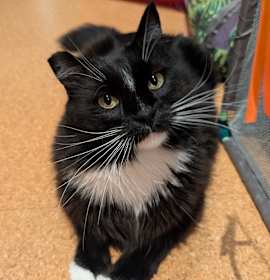
Ralphie
Domestic Longhair
Male, 3 yrs 5 mos
Sherman Oaks, CA
Good with cats
Spayed or Neutered
Shots are up-to-date

Macy Gray
Domestic Longhair
Female, 2 yrs 2 mos
Los Angeles, CA
Good with dogs
Good with cats
Spayed or Neutered
Shots are up-to-date
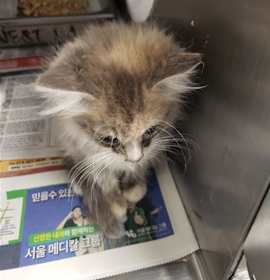
NATIVITY
Domestic Longhair
Female, 1 yr 4 mos
Los Angeles, CA
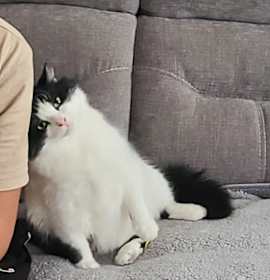
Lial
Domestic Longhair
Male, adult
West Los Angeles, CA
Good with dogs
Good with cats
House-trained
Spayed or Neutered
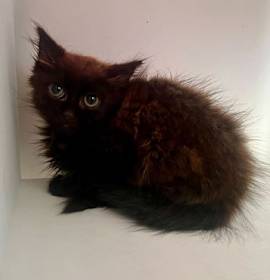
Dim Sum
Domestic Longhair
Male, young
Los Angeles, CA
Needs special attention
House-trained
Spayed or Neutered

Luna
Domestic Longhair
Female, 1 yr 5 mos
los angeles, CA

Rembrandt & Salem
Domestic Longhair
Male, 2 yrs 3 mos
Sherman Oaks, CA
Shots are up-to-date

Fifi
Domestic Longhair
Female, 2 yrs 10 mos
Sherman Oaks, CA
Spayed or Neutered
Shots are up-to-date

Ralphie
Domestic Longhair
Male, 3 yrs 5 mos
Sherman Oaks, CA
Good with cats
Spayed or Neutered
Shots are up-to-date

Macy Gray
Domestic Longhair
Female, 2 yrs 2 mos
Los Angeles, CA
Good with dogs
Good with cats
Spayed or Neutered
Shots are up-to-date

NATIVITY
Domestic Longhair
Female, 1 yr 4 mos
Los Angeles, CA

